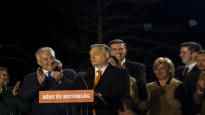Hungarian Prime Minister Viktor Orbán has been systematically concentrating power since 2010, writes ‘s EU editor-in-chief Janne Toivonen.
BUDAPEST Many supporters of the Hungarian opposition spontaneously burst into tears in Sunday night’s election observation as the result of the parliamentary election dawned.
The place in Budapest was symbolic: a beautiful skating rink completed in 1870, the first of its kind in Europe, a remnant of the city’s golden age of the late 19th century and the greatness of Hungary’s past.
In April 2022, the ice rink got to witness the birth of dictatorship directly in the heart of the European Union.
Prime minister Viktor Orbánin the far-right Fidesz party has taken the country on such an ironic occasion that a fragmented and divided opposition was forced to unite into a six-party coalition to make the overthrow of Orbán even theoretically possible.
The company ended in a miserable stomach. Opposition candidate for prime minister Peter Mark-Zay did not even win its own constituency, but that too went to Fidesz in clear numbers.
“Democracy has spoken, the buzz away.”
Central politician Johannes Virolaisen the words from 1980 are familiar and frequently used in loss situations. They are very ill-suited to Hungary.
Pulina is enough, and for a reason.
In 12 years, Orbán has consolidated his power hard
The new four-year season in power is already Orbán’s fourth in the pipeline.
Immediately after winning the 2010 election, he began a rapid run-down of democracy.
First, free media was smoked. New ones from Fidesz media law (you move to another service) came into force in 2011, and now the body has already cooled down. The nationwide mainstream media is no longer a propaganda machinery that faithfully reproduces government messages from day to day.
There are only a few websites left whose living space is constantly shrinking. A Youtube channel spun on opposition screens Partizan (you switch to another service) cheap election studio because there were no other even remotely neutral broadcasts.
In Hungary, the winner of each constituency gets one seat in parliament, and the rest is determined by a nationwide list election.
Orbán modified constituencies according to Fidesz’s lines of support, and constituency victory votes were ordered to be included in the list election to prop up support.
In addition, 600,000 dual nationals living outside the country were given the right to vote – and they generally support Fidesz.
The reform was an immediate success. Since then, Fidesz and the auxiliary party KDNP have consistently had a two-thirds majority in Parliament, meaning that there is almost no room for maneuver.
In this election, Fidesz and the KDNP won 135 seats out of 199. It can be compared to a situation in which one party in a Finnish parliament of the same size would have about 120 representatives and less than twenty in its auxiliary party.
While Fidesz also holds key positions in the bureaucracy, it is very difficult to gain power.
In 2018, an election observer, the Organization for Security and Cooperation in Europe (OSCE), criticized Hungary in a nutshell (you switch to another service) everything but outright electoral fraud. The OSCE is expected to do the same now.
EU money is valid, common rules are not
In non-European countries, the construction of dictatorships is commonplace.
But Hungary is a wash-resistant EU country that adopted in 2014-2020 EUR 27 billion (switching to another service) joint EU structural assistance. Hungary clearly benefits from membership: it receives clearly more from the EU budget than it costs there.
The EU has lacked a desire to blackmail one member state with democratic reforms. In the eyes of the EU, there is too much corruption, minorities are being trampled on and media freedom should be restored.
The EU has tried well: criticized and mourned. It has had no effect on Orbán. Only now is the line in Brussels changing.
The EUR 7 billion earmarked for Hungary under the EU’s recovery instrument is already frozen. In February, the European Court of Justice ruled that structural aid could also be suspended if a member state did not meet the EU’s jointly agreed democratic requirements.
The money is worth Orbán. At the same time, he has referred to the rules to which the country committed itself when it joined the EU.
If the EU continues to deny subsidies, Fidesz will face tightening its belts. Plush election budgets have gnawed at the treasury, and the impact of EU subsidies on sustaining economic growth is estimated to be significant, even a couple of percentage points (switch to another service) size.
Orbán’s crushing victory came as a surprise to many after all
The crying on the skating rink after Fidesz’s new crushing victory was confirmed came as a surprise to many.
Two self-proclaimed representatives of a sexual minority said they were considering moving out of Hungary. At the tables, the young townspeople sipped palina and stared into the emptiness.
So much hope was placed on the success of the opposition that the truth was blurred. The truth is that Orbán is a skilled and very popular politician in Hungary.
Orbán is also the president of Russia Vladimir Putin best friend in the EU. This, too, was expected to hit the opposition, as Russia’s invasion of Ukraine has been widely condemned across Europe and Hungary has supported Russian sanctions.
It happened differently. Orbán only increased his support, and in addition, the far-right Mi Hazank party (in Finnish Kotimaani) rose to parliament.
With the crisis looming over the border and Ukrainian refugees appearing almost everywhere in Hungary, citizens grabbed a familiar credit man.
In the system he adapted, Orbán once again got the keys from the people. The concentration of power can continue.
Hungary is on a path that inevitably awaits separation or separation from the EU. It does not seem to bother supporters, but the situation in Russia brings unpredictability to development that is unpredictable.
